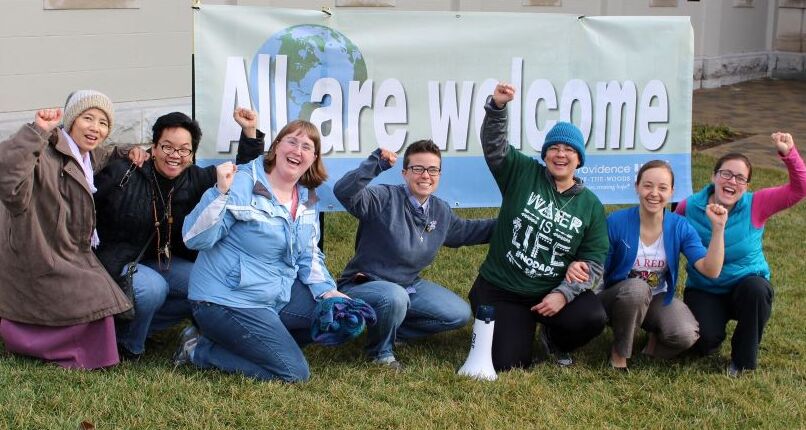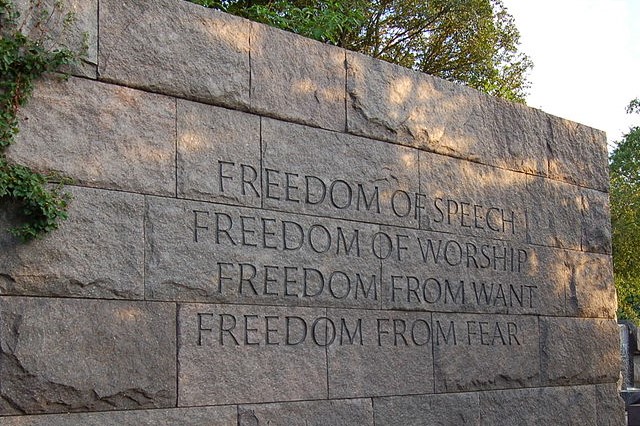
Pictured are women in initial transformation with the Sisters of Providence at the community's motherhouse campus at St. Mary of the Woods, Indiana, in 2016. They are: Anna Fan, Dina Bato, Arrianne Whittaker, Corbin Hannah, Joni Luna, Tracey Horan and Emily TeKolste. (Courtesy of Emily TeKolste)
In January 2016, during a "Gathering in Solidarity," my congregation unveiled a banner proclaiming "All Are Welcome," which has been positioned outside the church on our motherhouse campus at St. Mary-of-the-Woods, Indiana, ever since.
Following the unveiling, one of our sisters began probing deeper in her own self-reflection. "Do I welcome white supremacists?" she asked. Her question points to what some have called the "paradox of inclusion." How do we include everyone if the inclusion of everyone leads to the oppression or exclusion of some people by other people we are including?
I've been thinking about that lately as the specter of white Christian nationalism has become more and more obvious in our nation. Do we truly have the freedoms we claim to have?
For example, our Bill of Rights proclaims freedom of religion by stating that "Congress can make no law respecting an establishment of religion or prohibiting the free exercise thereof." But if antisemitic white supremacists stand guard around the synagogue, the U.S. Constitution makes no provision for ensuring the rights of Jews to practice their religion in peace. As such, do they truly have freedom of religion? Does Congress have a responsibility to act to ensure the safety of Jewish worshippers?
According to the Markkula Center for Applied Ethics at Santa Clara University, "Positive rights are rights that provide something that people need to secure their wellbeing. … Positive rights impose a positive duty on us — the duty actively to help a person to have or to do something.”
President Franklin D. Roosevelt articulated the necessity of both positive rights and negative rights (rights secured by preventing someone from acting against those rights) in his 1941 State of the Union address, which became known as the "Four Freedoms" speech. He called these things "essential freedoms … everywhere in the world": freedom of expression, freedom of worship, freedom from want and freedom from fear.

An engraving of the Four Freedoms at the Franklin Delano Roosevelt Memorial in Washington, D.C. (Creative Commons Attribution-Share Alike 3.0/Michael Kranewitter)
Roosevelt was facing down a worldwide threat to democracy similar to what we are facing today. He knew he was fighting a war on two fronts: the fascists in military uniforms that were attempting to take over the world and the despair and great need of people on the home front during the Great Depression. Roosevelt saw these two realities as connected, saying:
For there is nothing mysterious about the foundations of a healthy and strong democracy. The basic things expected by our people of their political and economic systems are simple. They are:
- Equality of opportunity for youth and for others.
- Jobs for those who can work.
- Security for those who need it.
- The ending of special privilege for the few.
- The preservation of civil liberties for all.
- The enjoyment of the fruits of scientific progress in a wider and constantly rising standard of living.
Roosevelt's vision surely sounds a lot like the visions of many of the prophets of the Hebrew Scriptures. It surely sounds like a vision that we need in our world today.
The world right now looks grim, as it did in the times of the Hebrew prophets. We have been talking of the coming dystopia for years. This past weekend, however, I realized in a new way that the dystopia is already here. Dystopia just depends on what side of power you're on.
In every work of dystopian fiction, there are people for whom the society is working. In The Hunger Games it’s the residents of the Capitol. In The Handmaid’s Tale it’s the commander and the rulers of the Republic of Gilead. The list could go on. These people are living great lives of great comfort, as are many in today's society.
Advertisement
From which side of power do we see the world?
The truth is that Jesus, too, lived in a dystopian society. God entered into the world by choosing to live among the oppressed of the society — as a Jew in Roman-occupied Palestine.
Just as the cross wasn’t the end of Jesus’s story, our current dystopia doesn’t have to be the end of ours. We must act together to ensure that all have what they need to truly thrive. As a society, we must embrace positive rights and act to ensure the provision of those rights to all around the world.
In his "Four Freedoms" speech, Roosevelt said, "I have called for personal sacrifice. I am assured of the willingness of almost all Americans to respond to that call."
It doesn't always seem today that we can have the same confidence in our fellow Americans as Roosevelt had in his. May we find ways to reach out to our better angels and inspire ourselves and our fellow Americans to greatness — the greatness of generosity and care for all.
Are all welcome? Only if we are willing to ensure all have what they need to thrive will all be truly welcome.






